Vinyl flooring has been a popular interior decor for countless years. It is perfect for providing most homes with a clean, modern, and easy-to-care look. However, when it accumulates on concrete, vinyl flooring’s adhesive can be a problem. The glue usually remains stuck on the concrete while removing the vinyl, which can be challenging to eliminate.
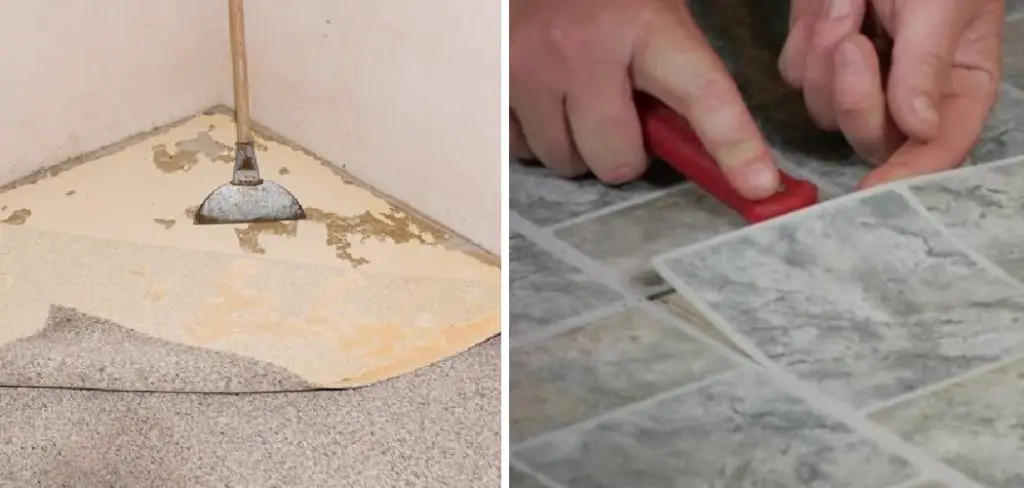
This sticky substance can detract from the floor’s natural beauty, making many homeowners decide to remove it. Removing this glue might be challenging, but it can be done successfully using the right tools and techniques. This article will explore several methods on how to remove vinyl flooring glue from concrete.
Can You Remove Vinyl Flooring Glue from Concrete?
What do you do when left with unsightly vinyl glue stains on your concrete floor? The good news is that removing vinyl flooring glue from concrete is possible, though it can be quite challenging. While the task requires a bit of elbow grease and some patience, there are several methods you can try. One solution uses hot water and dish soap, while another uses a heat gun. Regardless of your chosen approach, it’s important to approach the process cautiously to avoid damaging your concrete floor. With a bit of effort, you can remove the vinyl glue stains and restore your concrete floor to its former glory.
Why Should You Remove Vinyl Flooring Glue from Concrete?
Removing vinyl flooring glue from concrete might seem tedious and unnecessary, but it can significantly impact the overall appearance and safety of your space. Not only can old glue make your floors look dirty and worn out, but it can also pose a tripping hazard for anyone walking or working in the area. Additionally, removing the glue can improve the adhesion of new flooring materials, ensuring a smoother, more secure installation. So, whether you’re renovating your home or simply updating your workspace, taking the time to remove old vinyl flooring glue is a smart investment in both aesthetics and safety.
7 Methods to Follow on How to Remove Vinyl Flooring Glue from Concrete
Method 1: Using a Heat Gun
A heat gun can soften the adhesive, making it easier to scrape off. Ensure a ventilated area and safety equipment before proceeding. Typically, it would take the heat gun a minute or two to warm up the adhesive until it’s soft. After that, you can use a scraper to chip it off. You may need to reheat it if the glue hardens up again. The heat gun method is effective but can be tedious, especially for a large floor area.
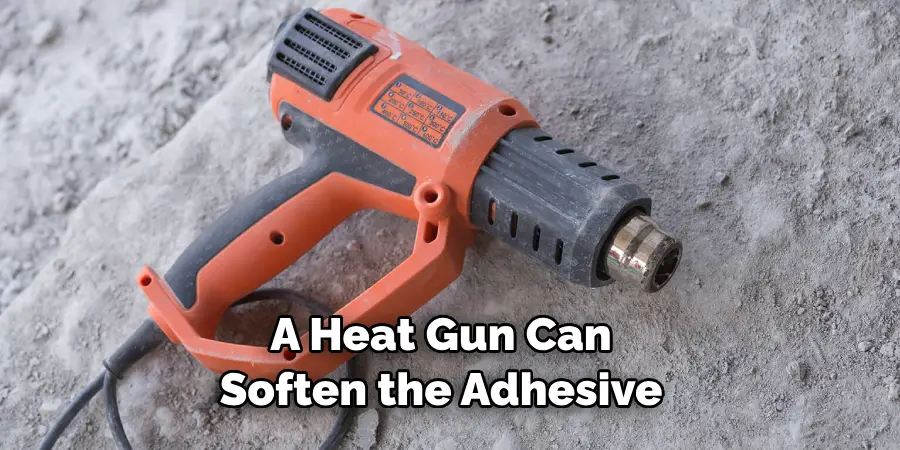
Method 2: Scraping and Chemical Removers
Several chemical removers can be used to eliminate the vinyl flooring glue from concrete surfaces. These compounds typically melt the adhesive, making it easier to scrape it off. However, handling them properly and following safety precautions would be best since some removers can contain harsh chemicals.
Ensure a well-ventilated area when working with these chemicals to eliminate the possibility of inhaling the fumes. Use a scraper to remove the softened glue once the chemical reaction begins. You may also need to repeat this process several times to remove the stubborn residue.
Method 3: Sanding
For a DIY method, sanding can do the trick. Use a floor sander with heavy-grit sandpaper to remove the vinyl flooring glue from the concrete floor. Sandpaper is usually designed to take away the tough adhesive without harming the concrete. Sanding can be particularly effective when working with a small area. However, for larger areas, this method can take time and patience, making it frustrating.
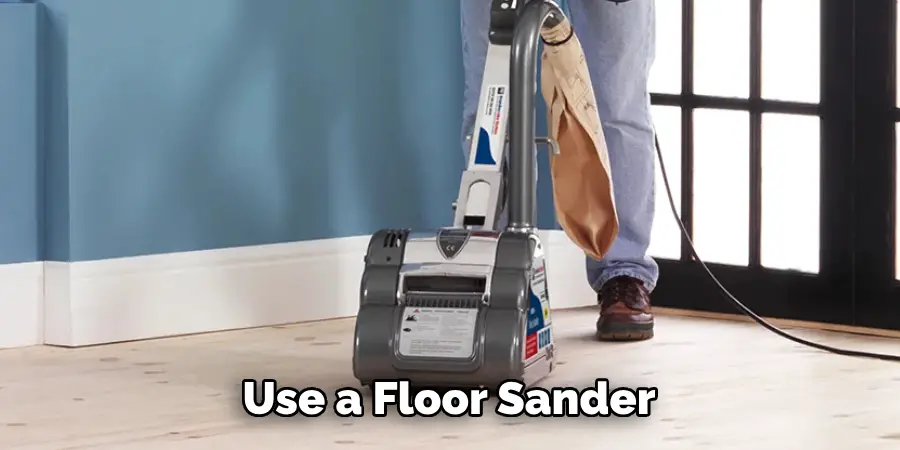
Method 4: Renting a Floor Buffer Machine
One of the most effective and efficient methods to remove vinyl flooring glue from concrete is renting out a floor buffer machine. These machines look similar to vacuum cleaners, but they are equipped with hard-bristle pads and a large motor to remove any stubborn adhesive left behind. Heavy-grit sandpaper can sand down the concrete floor after removing any adhesive residue. Renting floor buffer machines might be costly, but it’s the quickest method for removing any stubborn adhesive without damaging the concrete.
Method 5: Using a Hammer and Chisel
Using a hammer and chisel is an old-fashioned way to remove the adhesive. The hammer will help you chip away the glue as much as possible, while the chisel is used to scrape off any remaining bits of glue on the surface. This method should be done cautiously since there’s a risk of damaging the concrete.
Method 6: Using Paint Stripper
A paint stripper can also remove vinyl flooring glue from concrete surfaces. It may take a few applications for the paint stripper to loosen up the adhesive. After that, you can use a scraper or an old putty knife to scrape away any remaining bits of glue. Keep in mind that paint stripper can be a bit messy, so you have to use it with caution.
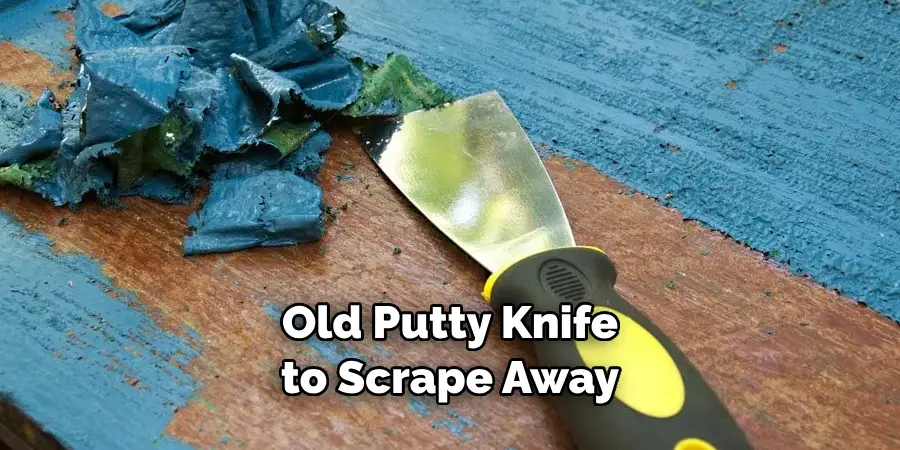
Method 7: Using a Pressure Washer
A pressure washer is highly effective for removing any remaining residue from concrete surfaces. This method requires little effort since you only need to spray the affected area with water or another cleaning solution. It should take a few minutes to completely remove the vinyl flooring glue from the concrete. However, set the pressure washer low to avoid damaging the concrete.
Removing vinyl flooring glue from concrete can be an arduous task. Fortunately, there are several methods that you can use, depending on your preference and budget. Whichever method you choose, it’s important to follow safety precautions to ensure maximum effectiveness and that the concrete will remain intact. With patience and the right methods, you can get your concrete floor looking like new again in no time.
5 Considerations Things When You Need to Remove Vinyl Flooring Glue from Concrete
1. The Type of Adhesive Used
The first thing you need to consider when removing vinyl flooring glue from concrete is the adhesive used. There are two main types of adhesives that are used for vinyl flooring: water-based and solvent-based. Water-based adhesives are much easier to remove than solvent-based adhesives, so it will be much easier to remove if you can identify the type of adhesive used.
2. The Age of The Adhesive
Another thing to consider is the age of the adhesive. If the adhesive is fresh, it will be much easier to remove than old and dried out. If you can’t determine the age of the adhesive, you may want to try a few different removal methods to see which one works best.
3. The Temperature
Temperature can also affect how easy it is to remove vinyl flooring glue from concrete. If it is cold outside, the glue will be more difficult to remove because it will be harder to soften. If it is hot outside, the glue will be easier to remove because it will be softer.
4. The Amount of Glue
The amount of glue on the concrete will also affect how easy it is to remove. If there is a lot of glue, it will be more difficult to remove than if there is only a small amount. You may need to use a stronger solvent or a higher concentration of cleaner if there is a lot of glue.
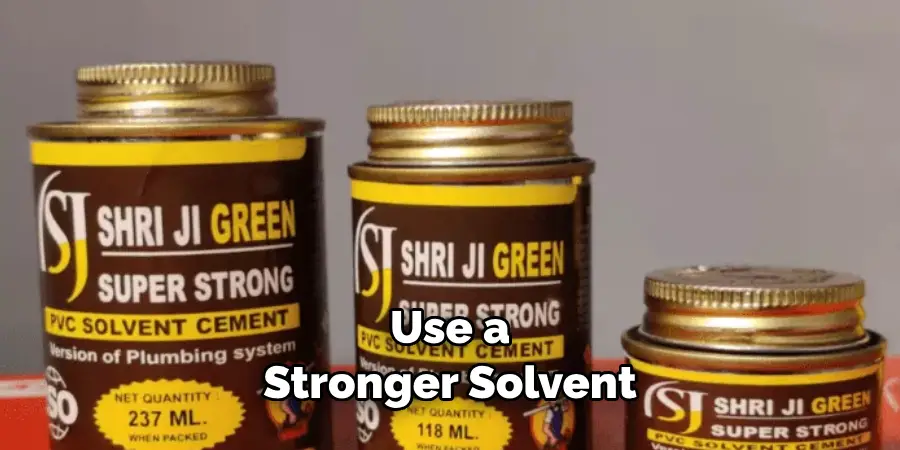
5. The Type of Concrete
The type of concrete can also affect how easy it is to remove vinyl flooring glue from concrete. If the concrete is very smooth, it will be easier to remove the glue than if the concrete is rough. You may need a different removal method if the concrete is rough.
Benefits of Remove Vinyl Flooring Glue from Concrete
Removing vinyl flooring glue from concrete might seem tedious, but the benefits are worth it. Firstly, it can improve the overall appearance of your flooring and boost the value of your property. Glue residue can discolor the concrete and make it look unsightly. Secondly, removing the glue can make it easier to install new flooring.
The surface will be smoother and allow for a more secure installation. Lastly, it can also improve the air quality in your home. Old glue residue can harbor bacteria and allergens, harming your health. Removing it can create a healthier environment for you and your loved ones. So, if you have old vinyl flooring with glue residue, consider removing it for a cleaner, smoother, and healthier home.
Some Common Mistakes People Make When Trying to Remove Vinyl Flooring Glue from Concrete
Removing vinyl flooring glue from concrete can be difficult; unfortunately, some common mistakes can make the task even more challenging. One mistake often made is using the wrong type of adhesive remover. It’s important to choose a product specifically designed for vinyl flooring glue removal, as general adhesive removers may not be effective.
Another mistake is failing to adequately prepare the area before starting the removal process. This can include not removing furniture or appliances, not covering nearby surfaces, or not wearing protective gear. Not giving the adhesive remover enough time to work or using too little of the product can also result in an incomplete removal. You can successfully rid your concrete floor of unsightly vinyl flooring glue by avoiding these mistakes and following the proper removal steps.
Conclusion
Removing vinyl flooring glue from concrete is daunting, but it’s achievable using the right tools and techniques. Whether you use heat guns, chemical removers, sanding, or rent a floor buffer machine, carefully research and treat the adhesive to achieve favorable results. Each method has advantages and disadvantages, but the best method depends on the extent of your project and the tools or resources you have at your disposal. We hope that this article has given you enough knowledge and insight into how to remove vinyl flooring glue from concrete successfully.
